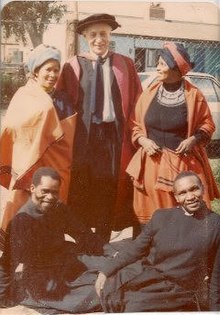Clement Martyn Doke was a South African linguist working mainly on African languages. Realizing that the grammatical structures of Bantu languages are quite different from those of European languages, he was one of the first African linguists of his time to abandon the Euro-centric approach to language description for a more locally grounded one. A most prolific writer, he published a string of grammars, several dictionaries, comparative work, and a history of Bantu linguistics.

Carl Friedrich Michael Meinhof was a German linguist and one of the first linguists to study African languages.
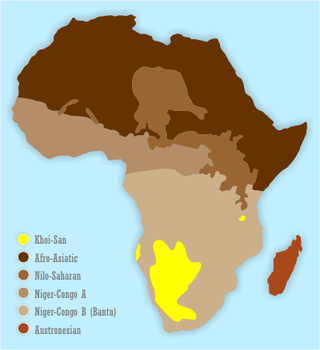
The Khoisan languages are a number of African languages once classified together, originally by Joseph Greenberg. Khoisan is defined as those languages that have click consonants and do not belong to other African language families. For much of the 20th century, they were thought to be genealogically related to each other, but this is no longer accepted. They are now held to comprise three distinct language families and two language isolates.
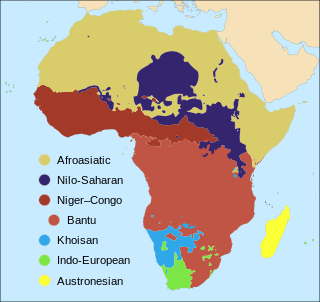
The number of languages natively spoken in Africa is variously estimated at between 1,250 and 2,100, and by some counts at over 3,000. Nigeria alone has over 500 languages, one of the greatest concentrations of linguistic diversity in the world. The languages of Africa belong to many distinct language families, among which the largest are:
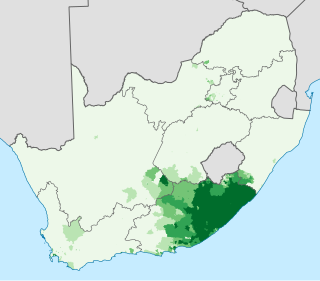
Xhosa, formerly spelled Xosa and also known by its local name isiXhosa, is a Nguni language, indigenous to Southern Africa and one of the official languages of South Africa and Zimbabwe. Xhosa is spoken as a first language by approximately 10 million people and as a second language by another 10 million, mostly in South Africa, particularly in Eastern Cape, Western Cape, Northern Cape and Gauteng, and also in parts of Zimbabwe and Lesotho. It has perhaps the heaviest functional load of click consonants in a Bantu language, with one count finding that 10% of basic vocabulary items contained a click.
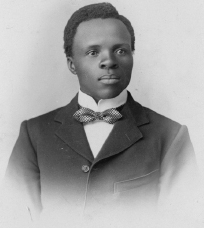
Solomon Tshekisho Plaatje was a South African intellectual, journalist, linguist, politician, translator and writer. Plaatje was a founding member and first General Secretary of the South African Native National Congress (SANNC), which became the African National Congress (ANC). The Sol Plaatje Local Municipality, which includes the city of Kimberley, is named after him, as is the Sol Plaatje University in that city, which opened its doors in 2014.
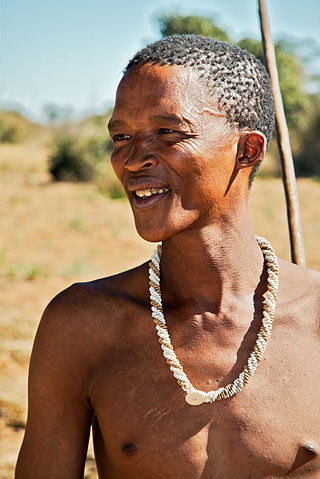
KhoisanKOY-sahn, or Khoe-Sān, is a catch-all term for the indigenous peoples of Southern Africa who traditionally speak non-Bantu languages, combining the Khoekhoen and the Sān peoples. Khoisan populations traditionally speak click languages and are considered to be the historical communities throughout Southern Africa, remaining predominant until European colonisation in areas climatically unfavorable to Bantu (sorghum-based) agriculture, such as the Cape region, through to Namibia, where Khoekhoe populations of Nama and Damara people are prevalent groups, and Botswana. Considerable mingling with Bantu-speaking groups is evidenced by prevalence of click phonemes in many especially Xhosa Southern African Bantu languages.

Khoekhoe are the traditionally nomadic pastoralist indigenous population of South Africa. They are often grouped with the hunter-gatherer San peoples. The designation "Khoekhoe" is actually a kare or praise address, not an ethnic endonym, but it has been used in the literature as an ethnic term for Khoe-speaking peoples of Southern Africa, particularly pastoralist groups, such as the !Ora, !Gona, Nama, Xiri and ǂNūkhoe nations. The Khokhoe were once known as Hottentots, a term now considered offensive.

Hottentot is a term that was historically used by Europeans to refer to the Khoekhoe, the indigenous nomadic pastoralists in South Africa.
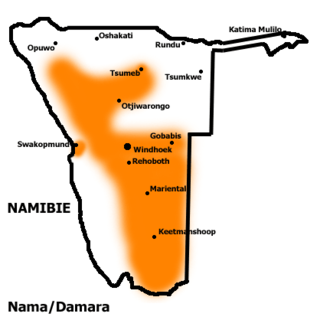
Khoekhoe, also known by the ethnic terms Nama, Damara (ǂNūkhoegowab), or Nama/Damara and formerly as Hottentot, is the most widespread of the non-Bantu languages of Southern Africa that make heavy use of click consonants and therefore were formerly classified as Khoisan, a grouping now recognized as obsolete. It belongs to the Khoe language family, and is spoken in Namibia, Botswana, and South Africa primarily by three ethnic groups: Namakhoen, ǂNūkhoen, and Haiǁomkhoen.
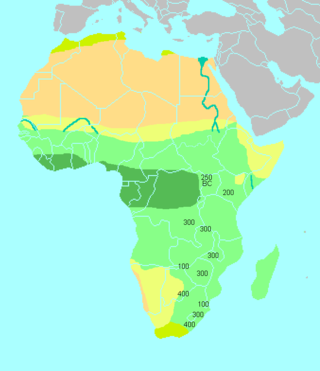
The Bantu expansion was a major series of migrations of the original Proto-Bantu-speaking group, which spread from an original nucleus around West-Central Africa. In the process, the Proto-Bantu-speaking settlers displaced, eliminated or absorbed pre-existing hunter-gatherer and pastoralist groups that they encountered.

KhweKWAY is a dialect continuum of the Khoe branch of the Kwadi-Khoe family of Namibia, Angola, Botswana, South Africa, and parts of Zambia, with some 8,000 speakers.
The Kingdom of Mapungubwe was a medieval state in South Africa located at the confluence of the Shashe and Limpopo rivers, south of Great Zimbabwe. The name is derived from either TjiKalanga and Tshivenda. The name might mean "Hill of Jackals" or "stone monuments". The kingdom was the first stage in a development that would culminate in the creation of the Kingdom of Zimbabwe in the 13th century, and with gold trading links to Rhapta and Kilwa Kisiwani on the African east coast. The Kingdom of Mapungubwe lasted about 140 years, and at its height the capital's population was about 5000 people.

The Tuu languages, or Taa–ǃKwilanguages, are a language family consisting of two language clusters spoken in Botswana and South Africa. The relationship between the two clusters is not doubted, but is distant. The name Tuu comes from a word common to both branches of the family for "person".
The Khoe languages are the largest of the non-Bantu language families indigenous to Southern Africa. They were once considered to be a branch of a Khoisan language family, and were known as Central Khoisan in that scenario. Though Khoisan is now rejected as a family, the name is retained as a term of convenience.
The Prehistory of South Africa lasts from the Middle Stone Age until the 17th century. Southern Africa was first reached by Homo sapiens before 130,000 years ago, possibly before 260,000 years ago. The region remained in the Late Stone Age until the first traces of pastoralism were introduced about 2,000 years ago. The Bantu migration reached the area now South Africa around the first decade of the 3rd century, over 1800 years ago. Early Bantu kingdoms were established in the 11th century. First European contact dates to 1488, but European colonization began in the 17th century.

The Nguni people are a linguistic cultural group native to and formed in South Africa, made up of ethnic groups formed indigenously in South Africa from hunter-gatherer pygmy and proto-agrarians, with offshoots in neighboring colonially-created countries in Southern Africa. Swazi people live in both South Africa and Eswatini, while Ndebele people live in both South Africa and Zimbabwe.
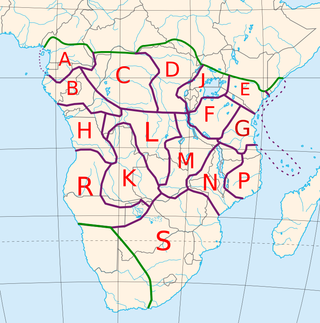
The Bantu peoples are an ethnolinguistic grouping of approximately 400 distinct native African ethnic groups who speak Bantu languages. The languages are native to 24 countries spread over a vast area from Central Africa to Southeast Africa and into Southern Africa.

Jonathan Westphal is an academic philosopher working on the philosophy of mind, metaphysics, philosophy of science, logic and philosophy of language and aesthetics. He was a pioneer in the philosophy of color. More recently he has become interested in issues in the philosophy of time, and in the understanding of human freedom. In the history of philosophy, he has worked mostly on Wittgenstein and Leibniz. He lives in Eastbourne, East Sussex, and works as a private tutor in philosophy.
